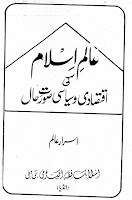This Book is written by an Islamic Scholar Asrar Alm, He wrote many causes of falling of Islamic Economy in world, Economic Position of Islamic World By Asrar Alm (Aalm E Islam Ki Iqtasadi Soort E Haal)
Ottoman government deliberately pursued a policy for the development of Bursa, Edirne (Adrianople) and Constantinople, successive Ottoman capitals, into major commercial and industrial centres, considering that merchants and artisans were indispensable in creating a new metropolis. To this end, Mehmed and his

successor Bayezid, also encouraged and welcomed migration of the Jews from different parts of Europe, who were settled in Constantinople and other port cities like Salonica. In many places in Europe, Jews were suffering persecution at the hands of their Christian counterparts. The tolerance displayed by the Ottomans was welcomed by the immigrants. The Ottoman economic mind was closely related to the basic concepts of state and society in the Middle East in which the ultimate goal of a state was consolidation and extension of the ruler's power, and the way to reach it was to get rich resources of revenues by making the productive classes prosperous. The ultimate aim was to increase the state revenues without damaging the prosperity of subjects to prevent the emergence of social disorder and to keep the traditional organization of the society intact.The organization of the treasury and chancery were developed under the Ottoman Empire more than any other Islamic government and, until the 17th century, they were the leading organization among all their contemporaries. This organization developed a scribal bureaucracy (known as "men of the pen") as a distinct group, partly highly trained ulema, which developed into a professional body. The effectiveness of this professional financial body stands behind the success of many great Ottoman statesmen. The economic structure of the Empire was defined by its geopolitical structure. The Ottoman Empire stood between the West and the East, thus blocking the land route eastward and forcing Spanish and Portuguese navigators to set sail in search of a new route to the Orient. The Empire controlled the spice route that Marco Polo once used. When Vasco da Gama bypassed Ottoman controlled routes and established direct trade links with India in 1498, and Christopher Columbus first journeyed to the Bahamas in 1492, the Ottoman Empire was at its zenith, an economic power that extended over three continents. Modern Ottoman studies think that the change in relations between the Ottomans and central Europe was caused by the opening of the new sea routes. It is possible to see the decline in the significance of the land routes to the East as Western Europe opened the ocean routes that bypassed the Middle East and Mediterranean as parallel to the decline of the Ottoman Empire itself. The Anglo-Ottoman Treaty, also known as the Treaty of Balta Liman that opened the Ottoman markets directly to English and French competitors, would be seen as one of the staging posts along this development.By developing commercial centres and routes, encouraging people to extend the area of cultivated land in the country and international trade through its dominions, the state performed basic economic functions in the Empire. But in all this the financial and political interests of the state were dominant. Within the social and political system they were living in Ottoman administrators could not have comprehended or seen the desirability of the dynamics and principles of the capitalist and mercantile economies developing in Western Europe.
Read Book directly on Google Books Here
Or Read This Book Here Below







0 comments:
Post a Comment
Press "Hide/Show" To Read Other's Comments